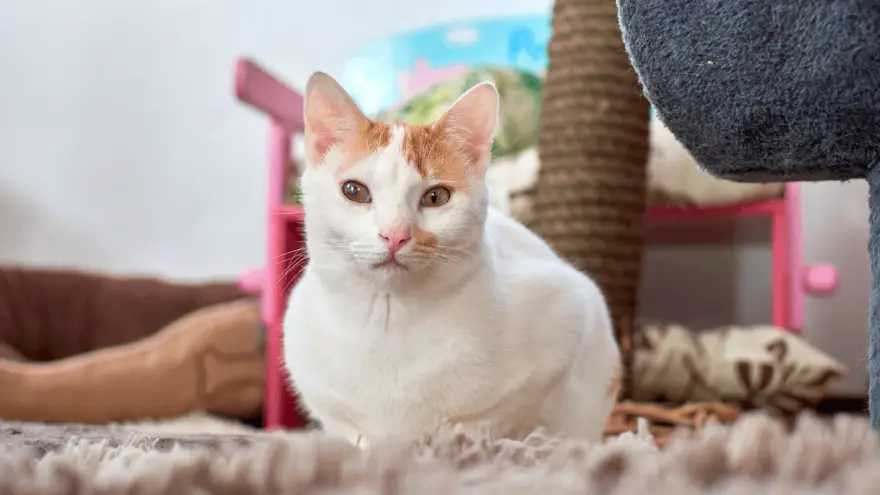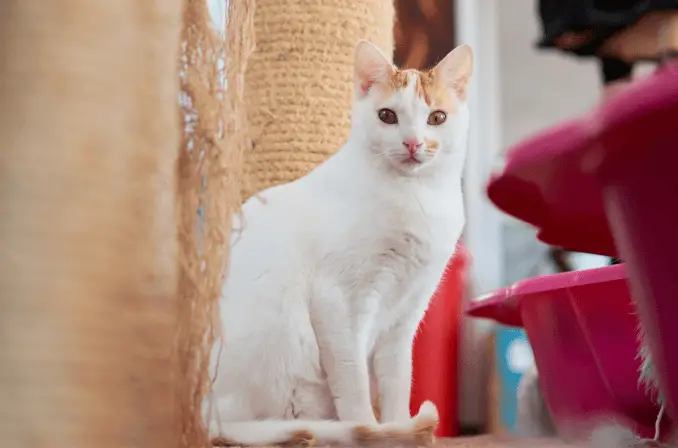
Anatoli Cat
The Anatoli cat is a short-haired version of the Turkish Van. It is not uncommon for owners and even breeders to confuse the two breeds. These cats are also known as Anatolians or Turkish Shorthairs, and they're one of the tallest breeds with a unique appearance. Although Anatoli cats are nearly identical to Turkish Angoras and Turkish Vans in almost every way, they are not officially classed as a variety of those cat breeds. Here's everything you need to know about the Anatoli breed.

Length:
14 - 17 in

Weight:
11 - 20 lb

Origin:
Turkey

Life Expectancy:
12 - 17 years
Breed History
All of today's cat breeds in Turkey are descended from old Anatolian wild cats. Anatoli is a natural cat that can be described as a short-haired Turkish Van genetic mutation. "Natural cats" are domestic cat populations that have evolved naturally without the interference of humans.
Simply said, the original populations from which the breeds evolved are wild cats, not pedigreed cats that have gone feral. In their homeland, they are known as Anadolu Kedish, whereas in the rest of the cat breeding world, they are known as Anatolis.
They originated in Turkey and debuted in a cat show in Germany in 1995. Anatoli cats were registered as a distinct breed by the World Cat Federation in 2001. Outside of its native Turkey, it is still a rare breed. A national breeding program was recently established in Turkey to help promote, protect, and maintain this cat breed.
Cat Breed Characteristics
Anatolis have muscular, powerful bodies that are medium in size. One of their distinguishing features is that their rear legs are slightly longer than their front legs, allowing them to jump to extremely high locations such as the top of your refrigerator or even the top of your door. Anatoli cats also have a strong, muscular tail and huge, spherical paws with tufts sticking out from between their toes. They have large heads, powerful cheeks, and dazzling eyes that should be almond-shaped.
Coat
They have a short, water-repellent coat with no woolly undercoat; the texture is delicate with a crispy quality. The hair on their bodies is fine-textured, and the hair on their tails is longer than the rest of the body. They are well-adapted to survive in the wild because of their coat.
Color
Anatoli cats, like the Turkish Van and Angora, come in various natural colors. The piebald gene determines their coat color, which means they are colorful cats with large patches of white. Tortoiseshell, red, blue, tabby in red, cream, black, and brown and blue are among the colors seen in this breed.

Size
The Anatoli breed is a medium-to-large size. They will most likely grow to be 14 - 17 inches long and weigh 10 - 20 pounds when they reach maturity. It is not the largest feline, but it is a good-sized cat.
Temperament
Anatoli cats are incredibly affectionate and kind towards their human families. They are also quite kind, especially around kids, despite their fairly large size. Anatolis are often called "gentle giants," and they enjoy being around people and other animals, fitting in nicely with families who already have pets.
These cats are also known for being quiet and calm, preferring to nap in your lap. They often show their happiness by purring, quietly meowing, and chirping. You will undoubtedly see them excitedly leaping to the tallest areas around the house. Mind you, that is when they aren't napping or relaxing with their people. These cats enjoy running, playing, and jumping. It is only fitting for such a muscular and athletic breed. Keeping these cats satisfied requires loads of toys, cat trees, and regular exercise and playing sessions with their families. Plus, they will even enjoy playing with other pets.
The Anatoli breed is distinctive in that it enjoys being near water. They are captivated by and attracted to water, just like their cousins, the Turkish Van. Anatoli cat owners shouldn't be shocked if their Anatoli cats decide to get wet the first chance they get. This is not typical of most cat breeds since most cats despise water, especially getting their coats wet.
Health
Whatever cat you choose, you should be aware that cats are prone to specific health problems. Although selective breeding has made these problems as infrequent as possible, they exist. The following are some of the health conditions that Anatoli cats are prone to:
- Hypertrophic cardiomyopathy - A condition in which the heart's muscle walls thicken, and the heart's effectiveness decreases.
World Cat Finder Team

Updated at20.04.2022.

Share